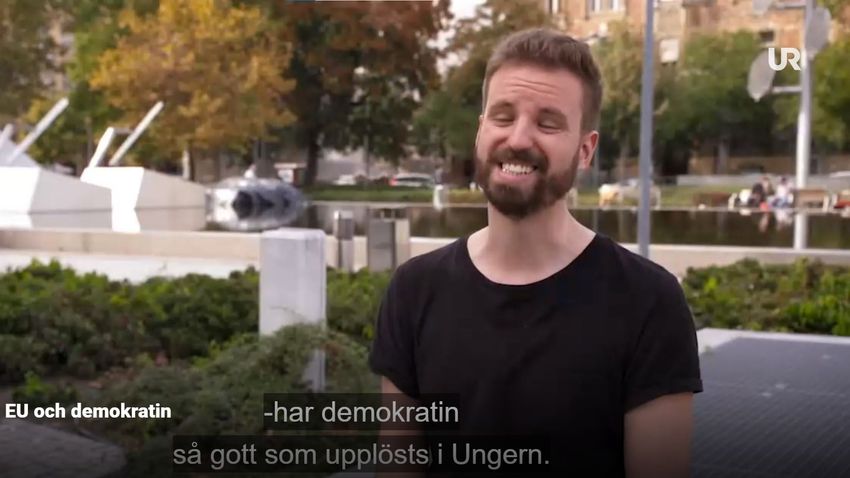In Hungary, democracy has slowly disappeared since 2010 - this is the start of the "educational film" from which Swedish schoolchildren can "find out" about our country.
A reader shared with the editors of Mandiner the experience of an eighth-grade student about what schoolchildren in Sweden hear about Hungary in social studies class.
Although it is not a textbook, but "only" a video compilation of school television with a special lesson plan, intended specifically for certain lessons and used in public education since 2019, the end result is still a knowledge material that Swedish teachers convey to the next generation.
The 10-minute, 40-second film, originally intended to deal with the theme "The EU and Democracy", starts with Márton Gulyás, who bluntly declares that democracy has gradually disappeared in Hungary since 2010.
The narrator then tells us that the government restricts freedom of the press and freedom of speech, and in fact (hold on, all Swedish eighth graders) abolishes gender divisions in a decree - commenting on which a former Swedish EP representative points out that the glass is full, Viktor Orbán has crossed all border.
Judith Sargentini, then a Swedish lecturer at CEU, arrives here in the spirit of pluralism.
who points out in front of Nádor utca 9. that the old building has been there for 200 years, but now they are moving to a new one - which the young Scandinavian viewer (especially in the context of the topic of the destruction of democracy) will obviously understand that the evil Hungarian government is destroying it by force a long-standing institution; especially since the lesson plan unfortunately does not say that the teacher stops the short film at this point, and the students look for the current campus or street view on the Internet, where the CEU sign is still blooming today both on the old palace and on the designer modern buildings.
But this CEU lecturer also says something else, namely that when he arrived in Hungary (as a student) in 1997, the atmosphere was very positive and optimistic, but then Orbán came and now (meaning: at the time of the recording, i.e. in 2019) is a huge disappointment.
The Swedish researcher does not burden us with numerical, objective evidence, but his assessment is confirmed by a Swedish "expert political scientist" who, based on his CV, knows only French and English, but not so much Hungarian that he even spells the name of Fidesz with an s. He teaches in California as well as in Sweden, but he has not even been to a conference in the Carpathian Basin area.
But he explains with sufficient determination to the Swedish students that in Hungary, politics intervenes more and more strongly in what is allowed to be taught and researched at the universities - that is, he explains this to the Swedish students in whose country an ethical investigation was launched in 2021 in the case of a famous researcher of Lund University, who published a study in a professional journal on rape cases in Sweden between 2000 and 2015, showing, among other things, that 48 percent of these crimes were committed by foreign nationals born abroad, and another 12 percent by second-generation immigrants. Although permission was sought and granted for the overall project itself, the final findings were not submitted for prior government approval, which is why the ball was stalled (the process was finally closed this summer after intent could not be proven).
But let's go back to the CEU block, which forms the core of the democracy defense training film, to round it off
Márton Gulyás states: "Hungary is the first EU member state that wants to prohibit a university from operating within the European Union".
He does not explain the idea further than that, so unfortunately it is left to us to figure out what the poet wanted to say, how the country, for example, prevented a CEU student from being able to defend "Feminist action for climate justice: gender-nature" in the EU's Vienna this year his thesis entitled "coloniality on the Generational Equality Forum"; in any case, at this point the Swedish teenagers can finally draw the conclusion that the Hungarians are a science-killing barbaric nation.
In order to relax, a Swedish girl living in Budapest comes next, who after school is shocked to show her classmates the textbook of her fifth-grade brother, in which a whole page is specifically about patriotism.
It is obvious that the Swedish viewer should already be able to imagine the word "patriotism", while otherwise in a competition called "In whose country there are more flagpoles in front of family houses, with the raised national flag" we would still be trying to interpret the announcement when the Swedes are already they would win by the length of the highway.
In any case, this transition is good so that the mentioned "expert political scientist" can say: In Hungary, the idea that there is a "true Hungarian people" is very strong, of which, for example, linguistic minorities and
the Roma are often excluded, but in a frank way, from the whole society, because "this world view is the basis of Fidesz" (the Swabians give everything to the "Csuti voivode", as a true democrat would say).
The lesson plan also does not mention here that it might be worthwhile to discover in the context of fact-checking, for example, that while 46 percent of Roma in Hungary are employed, 80 percent of them are unemployed in Sweden - instead, the task is to discuss what is the better solution: to protest against the system by leaving Hungary, or there remaining to formulate a dissenting opinion.
We are at exactly 7 minutes and 17 seconds, when the other party speaks for the first and last time, indirectly and cuttingly:
we can see two short excerpts from one of Viktor Orbán's speeches in the European Parliament, carefully surrounded by the world interpretation of Judith Sargentini and Guy Verhofstadt,
that Márton Gulyás then complains (ignoringly listening to his YouTube videos, which already had hundreds of thousands of views at the time): people have no real opportunity to express their dissent.
The compilation ends with a picture of a protester marching with a sign reading "STOP VIKTÁTOR", and the Swedish students have to explain, based on the words of Márton Gulyás, how an apparently democratic country can actually be a repressive regime.
For this reason, of course, there is no need to ask the Swedish ambassador - it would be more than enough if from now on, after watching the compilation, every teacher asked the Swedish schoolchildren to tell them how the short film made them feel about Hungary, and then they would jointly evaluate what kind of manipulative means the seemingly harmless video.
In that way, the students would really receive a lifelong lesson in apparent Europeanness and the importance of respecting democratic diversity.












